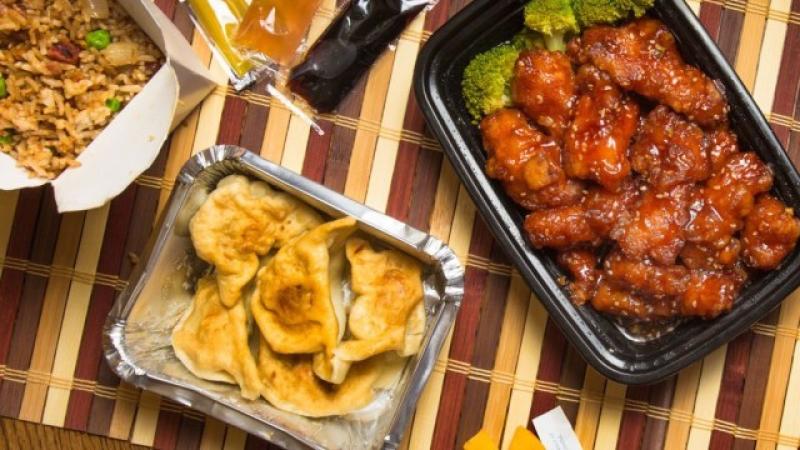Chinese Restaurant Entreés They Won't Eat in China


Chinese Restaurant Entreés They Won't Eat in China

If you've ever found yourself wondering while you're chowing down on your Chinese takeout order which of these dishes is the most popular in China, you won't have to think too hard about it. See, authentic Chinese food is much different than the Western versions that have been tweaked to broaden their appeal and they frankly just don't eat any of these meals in China.
The Chinese diet back home largely consists of plant-based food with little meat. Chinese-American cuisine, though often delicious, is almost the opposite; sweet, fried and meat heavy. We rounded up the most well-known meals that would be completely unfamiliar in China.
General Tso's Chicken

A huge percentage of Chinese restaurants in the U.S. offer a dish entitled General Tso's chicken. This sweet and spicy fried chicken dish is perhaps the most quintessential of American Chinese dishes. Although there is no recorded connection to him, it's named after General Tso Tsung-tang, a Qing dynasty general and statesman. Order it in a restaurant and you're signing up for a battered, fried dish containing up to 1,300 calories, 11 grams of saturated fat and 3,200 milligrams of sodium . If you think that sounds bad, you're right: It exceeds a person's entire daily recommended sodium intake, half of the recommended caloric intake and 1/3 to 1/2 of the recommended saturated fat limit. And while it can trace some roots to Hunan cooking, the version Americans recognize was invented in 1970s New York . Authentic Chinese? Fuggedaboutit.
Chop Suey

Shutterstock
Before General Tso's Chicken became a staple, Chop Suey was the "Chinese" dish that most Americans could name. According to the History Channel , the dish's origins can be traced to the California Gold Rush, when it was invented by enterprising Chinese restaurateurs to satisfy a bunch of drunken miners. The chefs scraped together leftovers, doused them in soy sauce, and presented this as "shap sui," which means "mixed pieces" or "odds and ends" in Chinese. Today, unless you skip the sauce, you're signing up for a ton of sodium. Chinese restaurants are infamous for adding too much salt to their food, says Lori Zadini, RD, CDE, of the Academy of Nutrition.
Crab Wontons

Shutterstock
Crab wontons are deep-fried dumplings filled with crabmeat and cream cheese, which does indeed come from the east—Philadelphia, to be exact. It's not really a thing in China as there are many people living there who are lactose intolerant . Another clue that these things aren't exactly authentic? The dish is also called Crab Rangoon. Rangoon is the former capital of Burma (now Myanmar), which is very much not in China. Although crab is a good source of protein and zinc, that's neutralized by the fat in the cream cheese and the process of deep-frying the whole package. If you order the Crab Wontons appetizer at PF Chang's , you're signing up for 37 grams of fat (8 of them saturated), and 630 mg of sodium. That's a much fat as one-and-a-third Big Macs and as much sodium as two orders of large fries !
4
Beef and Broccoli

If the beef is lean and derived from grass-fed cows, beef and broccoli provide significant nutrition. Beef contains protein, B vitamins and an assortment of minerals, while broccoli is both packed with vitamins and anti-cancer compounds. (One study found that men who ate three or more half-cup servings of broccoli per week had a 41 percent decreased risk for prostate cancer compared to men who ate fewer than one serving per week.) A study of Chinese dinner tables reveals that their version of broccoli is a leafy green, not the florets introduced to the US by Italian immigrants in the last 1800s. That's a technicality, but it doesn't make the versions served in Chinese restaurants healthy. They can top 900 calories—almost 50% of your recommended daily calorie allowance—and unless the beef is grass-fed (ask; it likely isn't), you're ingesting hormones and pollutants that can lead to belly-fat storage. Instead, stay home and make recipes from our guide to healthy Chinese food —there are hundreds of possible combinations!
Fortune Cookies

"Your imagination is a great asset" So goes a popular fortune-cookie saying. Imagination was definitely useful to enterprising Japanese immigrants (not Chinese) who popularized the barely edible sugar, flour, vanilla, sesame oil cookies on the U.S. West Coast in the 1900s . The Chinese are more likely to eat slices of orange for dessert, which are considered good luck. Perhaps that's because of the vitamin C they contain. "Vitamin C helps protect cells and keep them healthy," says Marie Murphy, a nutrition scientist at the British Nutrition Foundation. The USDA says the typical fortune cookie contains almost 7 grams of carbs and 4 grams of sugars. That's half of what's considered one serving of carbs—in one cookie! On your next Chinese dinner out, ask if you can chase your meal with citrus instead.




Having spent most of my life in North America, but the past more than 13 years in China, someone asked me if the Chinese food in China differs from the Chinese food in North America. In fact, is does. The dishes in North America have been altered to be palatable to North Americans' taste, and in fact, as shown in this article, many so-called "Chinese" dishes have been invented in North America, and are unknown in China.
This is my favourite fortune cookie cartoon:
LOL, now that is the perfect fortune cookie.
Well. it sure looks good
I'm sure it is, even if it isn't authentic.
I make my own Chinese dishes. While I do like some of the American style Chinese dishes, I much prefer doing things the authentic Chinese way. I buy much of what I use in my Chinese dishes at a small Chinese market near Los Angeles, and close to China Town. The market is small, but, crammed full of all kinds of goods. Some stuff I buy fresh, some dried. The Chinese Five Spices are really great and have such a super flavor, no matter what you use it on.
One of my Friends Brother married a Chinese lady from Thailand, and she taught me how to cook authentic Chinese dishes. They are really fun to eat, especially, using chop sticks. (grin)
Next time you do, take and post a photo and let's enjoy at least seeing, if not tasting.
I will try to remember to do that. People sometimes ask me for my recipe, but, that is a bit hard to do, as my taste buds are my only recipe.
It seems the most Chinese food today in America is the Sichuan style. I prefer the Cantonese style. That is why I cook my own Chinese dishes.
LOL. I prefer Cantonese myself, but Chongqing was once part of Sichuan province, and spicy food and hot pot are most favoured here.
I grew up eating Cantonese style Chinese, and my favorite is Pork Chow Mien. There is a restaurant in North Park in San Diego that has been there since before WWII, and they serve authentic Cantonese food. I lived not far from it for several years and ate there quite often.
Now days they serve both Sichuan and Cantonese style food, as there are people like me who prefer the old Cantonese style food, and others that prefer the Sichuan style. They are very busy from the time they open until closing time.
You know the food is pretty good when you see a good many older Chinese people there. They even have menus in Chinese for those who want/need them.
I sure do miss it now that I am living near Riverside CA. There is not anything like it up here anywhere. And as far as I know, it is the only one in San Diego.
And as far as I know, it is the only one in San Diego.
So, I cook even more of my own Chinese dishes now.
Yes, don't ever go into a restaurant that's empty or almost empty at lunch or dinner time. It's worth the wait to get the best meal when the restaurant is crowded.
I don't eat out much anymore. And you are correct about the crowd size being important, as an empty, or nearly empty, restaurant at what should be a busy time of the day says a lot about the quality of the food.
Not necessarily. Some restaurants dont do good business because they chose a bad location even though their food is good. This is something that actually happens all the time.
Or the food could be tasty but overpriced.
Dear Friend MUVA: We do not either.
The aging process is getting the better of Mrs. E. and me in this, and other ways as well.
Like our dear Sister Raven Wing, Mrs. E. and I prefer to prepare our meals at home when ever we can.
When I am on the road, its a best efforts basis.
Hope your Christmas celebration was a maximally successful one.
All the best in 2020.
P&AB.
Enoch.
Do you remember the name of the restaurant? One of my children loves Chinese food and will be moving to San Diego in a couple of months.
I don't know, MUVA. I'm not familiar with it, unless I've eaten it but didn't know its name in English.
Many years ago I wrote and posted an article about the incompetent marketing that I noticed here, and the most important three requirements that they fail in are "Location , Location and Location".
I haven't heard the term "Chop Suey" since I was a kid, many moons ago.
I've eaten Chop Suey as well, but, prefer the Chow Mien.